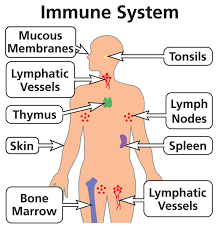The immune system is a collection of cells and molecules that have specific functions to defend the body against infection. Keeping fit and healthy is your best bet to maintain a strong immune system, this includes exercising regularly, sleeping well, keeping stress down, having a balanced diet and removing environmental triggers. Unfortunately, we can’t always change our environment or circumstances but we can give our bodies the best chance at fighting off illness by providing it with the right nutrition to support immune function.
Here are our top 9 supplements for supporting your immune system.
1.Vitamin C
A long-time favourite for many, vitamin C plays a powerful role in supporting the immune system through its anti-viral properties and action in maximising the body’s antioxidative capacity. What’s more, vitamin C levels are greatly reduced by infection due to an increased requirement in the metabolic processes so it’s useful to continue with supplementation during and post infection.
2. Vitamin D
We hear about it constantly every winter, and for good reason, an estimated one in five individuals in the UK are deficient in vitamin D. Vitamin D can modulate the immune response and deficiency in this is associated with increased susceptibility to infection, as well as increased autoimmunity and reduced bone health.
3. Vitamin A
Vitamin A is an anti-inflammatory vitamin, playing a crucial role in enhancing the immune system by regulating cellular immune responses and humoral immune processes. This means that it is involved in the processes that manage infections both outside and inside of the infected cells.
4. Zinc
Zinc is vital for the normal development and function of cells, including those that mediate innate immunity. This mineral also plays an important role in cell membrane repair and, therefore, wound healing. A deficiency in zinc can significantly impact your immune system’s ability to function properly, increasing risk of infection and disease, including the common cold. Lamberts Zincatest is a great way to test for deficiency and subsequently supplement.
5. Selenium
Selenium has antiviral activity, and research has suggested that a deficiency in this mineral can increase viral pathogenesis, essentially increasing the risk of a virus causing disease. In addition to this, it also has antioxidant properties which protects the immune system.
6. L-Glutamine
Glutamine is a versatile amino acid and fuels our immune cells, including the white blood cells known for their protection against illness and disease. During times of stress and/or illness the body cannot synthesise enough glutamine to satisfy the needs of the rapidly multiplying cells. For this reason supplementing with L-glutamine can provide support to the immune system during illness.
7. S. Boullardi
Saccharomyces Boullardi is a probiotic yeast, commonly used as a treatment or prevention of diarrhoea, including the infectious type. Research suggests it may also stimulate the immune response, decrease inflammation and act as an antimicrobial.
8. Garlic
Garlic is an amazing anti-inflammatory and antimicrobial, which means it’s a superb plant for supporting the immune system. However, the best way to consume garlic to reap these rewards is having it raw, not how people would typically consume it. Supplementing with garlic can be a great alternative to ensure you are getting it in the most beneficial strength.
9. Echinacea
The alcohols from this herb are often used in fighting the common cold and upper respiratory tract infection, with effects of reduced duration and/or severity of symptoms. The mechanism behind these results are believed to be an increased production of white blood cells to combat the infection.
Refs
Vitamin D British Nutrition Foundation
Vitamin D and the Immune System
Vitamin A and the Immune System
Vitamin C and the Immune System
Selenium and the Immune System
Glutamine and the Immune System

